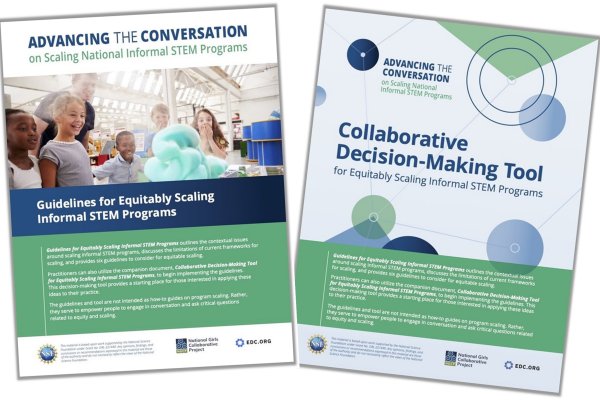Have you ever been part of an informal STEM program that started locally but expanded to additional locations? Perhaps you developed the program or even led its expansion to more libraries, afterschool sites, or museums. Maybe you played a role in funding the growing program, researching its impact, or evaluating its growth. However you have been involved in scaling informal STEM programs, you have probably encountered challenges, especially when it comes to centering equity.
For decades, the National Girls Collaborative Project (NGCP) and Education Development Center (EDC) have been involved in leading, supporting, and studying scaled-up informal STEM initiatives such as Leap into Science, a network of state leadership teams that empowers educators to lead science and literacy workshops for children and families, and Libraries as Community Hubs for Citizen Science, a network of libraries and other community-based organizations across the country working to engage their users in citizen science. Through our work on scaled informal STEM programs, we have experienced common challenges and pitfalls firsthand. We have also found a lack of research on the unique opportunities and barriers in scaling across informal STEM learning settings. The research that does exist is often rooted in formal K–12 educational reform and misses the unique complexities of informal STEM programs and systems.
To address this research gap, NGCP and EDC collaborated with practitioners across informal STEM learning to co-design a National Science Foundation-funded conference called “Advancing the Conversation on Scaling National Informal STEM Programs” (NSF Grant #2214449). The conference brought together voices from across the field, highlighting those often overlooked in discussions about scaling: the educators and leaders who directly shape the STEM experiences of youth and families. Our collective goal: To rethink how we approach scaling by focusing on equity from the start.
Following the convening, NGCP, EDC, and conference collaborators co-developed two resources for those interested in equitably scaling informal STEM learning programs and curricula. The resources are for, but not limited to, program developers, implementers, researchers, evaluators, and funders.
- Guidelines for Equitably Scaling Informal STEM Programs explores current research and frameworks for scaling, uncovering both limitations and contextual issues. Additionally, this resource introduces six guidelines derived from conference insights and aimed at fostering more equitable ways of scaling informal STEM programs.
The companion document, Collaborative Decision-Making Tool for Equitably Scaling Informal STEM Programs, helps practitioners implement the guidelines.

These resources are not how-to guides; instead, they empower you, whichever role you play in informal STEM learning, to ask critical questions regarding scaled programs, focus on equity from the beginning, and include necessary voices in the decision-making processes related to what programs youth and families need and want most.
Excited to dive in and learn more? Register for NGCP’s webinar, cohosted by EDC and practitioners across informal STEM learning spaces, “Scaling STEM Equitably,” on June 4, 2024, at 11 AM Pacific / 2 PM Eastern. The webinar will cover reflections from the field on the challenges and opportunities of collectively navigating equity-centered program scaling.
Additional Resources:
- Advancing the Conversation of Scaling National Informal STEM Programs - the project webpage that features project findings, links to the guidelines and tool, featured blog posts, and more
- Scaling Up STEM, Equitably - a roundtable conversation from conference participants sharing the benefits and opportunities of equitably scaling up informal STEM programs


